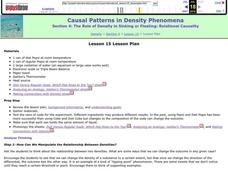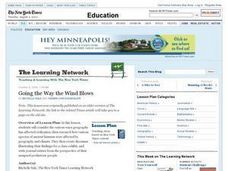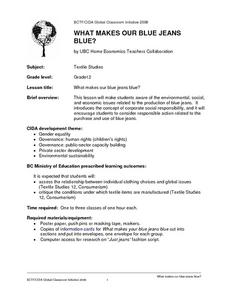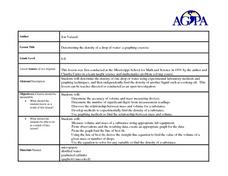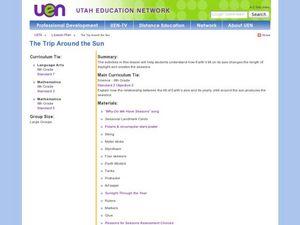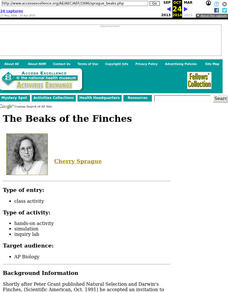Curated OER
FOOD FOR THE ANCESTORS
Students identify the foods associated with the "Days of the Dead Celebration." They compare and contrast these foods to the foods associated with American celebrations and become familiar with the foods of Mexico and their relationship...
Curated OER
The Role of Density in Sinking or Floating: Relational Causality
Students watch the teacher do a demonstration of density with diet and regular soda. Note: try this first, as different types of artificial sweetener have different densities. Students discuss density and volume. They discuss "Relational...
Curated OER
Going the Way the Wind Blows
Students examine the cause and effect relationship between geography and ancient civilizations. After reading an article, they determine how new findings can help scientists examine the migration patterns of these civilizations. Using...
Curated OER
WHAT MAKES OUR BLUE JEANS BLUE?
Twelfth graders become aware of the environmental, social and economic issues related to the production of blue jeans. They explore the relationship between individual clothing choices as well as global issues. In addition, they...
Curated OER
E. coli and Their Human Environment
High schoolers are able to observe how environmental changes (antibiotics) affect the growth of E. coli. They are able to use the "F" test for statistical analysis. Students can explain that E. coli is a common rod-shaped intestinal...
Curated OER
The Energy Debate - Global Warming
Students describe what global warming is, what causes global warming and the impact to our world. They study the threat of global warming and its relationship to the use of fossil fuels.
Curated OER
Biology: New Trials & Findings
Students use background knowledge to summarize articles about skin cancer research and present them to the class and place their studies along a clinical study timeline. They are introduced to clincal trails and to various aspects of...
Curated OER
Splatter Spread
Students assemble a potato cannon following directions. In groups, they analyze the spread pattern of paint soaked projectiles and discover the relationship between scatter and distance. They role play the role of a forensic scientist...
Curated OER
Math Medicine
Students solve real-world problems related to medical careers. They use graphical representations as part of the problem-solving process and work with fractions, decimals, exponents, and metric measurement. A demonstration is included to...
Curated OER
Types of Love (Dat)
Students examine the different types of love. They identify the various types of love and the behaviors associated with each. Although there are many kinds of love that we need to receive daily, most people will experience only one or...
Curated OER
Dolls in Tunics & Teddies in Togas
Students identify the basic components of male and female Roman
costume, both for children and adults and also, the major social ranks of Imperial Rome and the dress reserved for each gender and rank. They also identify some of the...
Curated OER
Education, Design & Empowerment: Part One
Middle schoolers consider the connection between poverty and education. In this language arts and social studies lesson plan, students research primary and secondary sources in order to explore the relationship between education and...
Curated OER
Determining the Density of a Drop of Water-A Graphing Exercise
Students determine the density of 1 drop of water. In this determining density lesson plan, students determine the mass and volume of a drop of water in the lab using appropriate lab techniques and calculate the density of a drop of water.
Curated OER
The Trip Around the Sun
Sixth graders investigate the relationship between the tilt of the Earth's axis and the seasons. In this earth science lesson, 6th graders sing the song "Why Do We Have Seasons" and use simulate the Earth's tilt by using their bodies.
Curated OER
Calculus Inverse Derivative
Young scholars solve equations using a given derivative. In this calculus lesson, students identify the rise of fall of each function. They use the calculator to find the derivative.
Curated OER
Concavity of a Graph
Learners explore the graph of a function. In this calculus lesson, young scholars identify when and where the graph is increasing or decreasing. They identify if it concave up or down by moving the cursor.
Curated OER
Interior Angles of Regular Polygons
High schoolers investigate the interior angles of a triangle. In this geometry lesson, students create the formula to calculate the angles inside a triangle. They observe the total sum of a triangles angle on the navigator.
Curated OER
Solving Exponential Equations
Solving exponential and logarithmic equations is taught in this interactive lesson. Students use properties of logarithm and exponents solve functions. They estimate the solution and use the Ti to find the exact solution.
Curated OER
Wetland Food Webs
Middle schoolers study life science. In this food webs and food chains comparison lesson, students examine the wetlands to discover the relationships that exist between the animals that live there. They participate in group activities...
Curated OER
Cells
Middle schoolers explore the cell and cell processes. They create "cytoplasm", make a model of the cell and its organelles, and simulate the osmosis and the diffusion of materials into and out of the cell.
Curated OER
Discovering Ohm's Law
Students explore the relationship of resistance, voltage, and current in series and parallel circuits using a computer model of a circuit board. They discover Ohm's Law by constructing series circuits.
Curated OER
Let's Gather Around the Circle
Scholars explore the relationship between circumference and diameter. Groups of learners measure the diameter and circumference of round objects and record their data on a given worksheet. They then input the data into their graphing...
Curated OER
First Rhythmic Composition
Students apply fractions to counting rhythm in music. In this algebra instructional activity, students interrelate the concept of math into music as they fill out a chart identifying the names and symbols of music notes and their...
Curated OER
The Beaks of the Finches
Students become birds and are given "beak-types". After completing the simulation, students relate results to adaptations and natural selection. Extensions of the simulation allow for comparative results and include population genetics.



